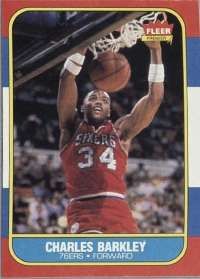Position: Forward
Charles Barkley: you can love him or hate him, but you can't ignore him. He's a folk hero who answers to the name "Sir Charles," a lifetime member of the All-Interview Team who's gone on to become the most popular commentator in sports, and as always, an explosion waiting to happen. Typical of Barkley, he wrote an impossible-to-put-down autobiography, Outrageous!, then had the audacity to try to halt publication of the book, claiming he'd been misquoted.
Advertisement
Despite being drastically undersized as a power forward -- listed at 6'6'' and 250 pounds but likely a couple inches shorter and a few hoagies heavier -- Barkley's unique shape earned him the clever moniker "Round Mound of Rebound" -- the veteran of 15 NBA seasons had an incredible impact on the floor. Barkley was a league MVP, 11-time All-Star, and two-time gold medal winner for Team USA. Remarkably, he is also the shortest player in NBA history to claim a rebounding title.
He has claimed some dubious records too, such as most technical fouls and most ejections in a career. He once was fined $5,000 for betting with an opposing player. In 1991, he spit at a heckler but missed, instead hitting an eight-year-old girl. That cost him $10,000. He punched Bill Laimbeer ($25,000) and even duked it out with one of his own teammates, Manute Bol. There was a breach of etiquette at the 1992 Olympics when he elbowed a player from Angola. Barkley raised the hackles of a nation when he claimed he wasn't a role model, and throughout his career, he never raised what he wanted most -- an NBA championship banner.
Barkley dominated basketball games at both small forward and power forward, compensating for his lack of height with the thrust of a 37-inch vertical leap. He weighed nearly 300 pounds in his formative years before sculpting his body into a 250-pound bowling ball. His strength and competitiveness are legendary. He once dunked so violently that the 2,200-pound basket support moved six inches. Early in his career, he did most of his scoring on fastbreaks, drives, and putbacks. Later, he added a long jump shot to his arsenal.
Barkley's journey began February 20, 1963, in Leeds, Alabama. He weighed less than six pounds at birth but grew into a rotund young man with passions for basketball, pizza, and petty thievery. He played center during his three years at Auburn University, averaging 14.1 points and 9.6 rebounds. When he left school after his junior season, the Philadelphia 76ers selected him in the first round of the NBA draft.
With the Sixers in 1984-85, Barkley averaged 14.0 points per game and made the All-Rookie Team. The next season, despite leading the NBA in fouls and turnovers, he won the IBM Award, which measures a player's overall contribution to his team's success. He led the NBA in rebounding (14.6 per game) in the 1986-87 season. In 1988-89, he led the league with 164 dunks and was runner-up to Magic Johnson for the Most Valuable Player Award, even though he had more first-place votes than Johnson.
Meanwhile, the Sixers struggled, never advancing past the Eastern Conference finals in Barkley's first eight seasons. He blamed his teammates and club owner Harold Katz and began to agitate for a trade. In June 1992, the Sixers shipped him to the Phoenix Suns for three players.
After a stopover in Barcelona -- where he led the 1992 Olympic Dream Team in scoring, with an 18.0 average on stellar .711 shooting -- Barkley reported to the Suns with a new lease on life. He won the MVP Award for the 1992-93 season, marking the first time in 10 years that the trophy wasn't given to Johnson, Larry Bird, or Michael Jordan. Barkley was fifth in the league in scoring (25.6), sixth in rebounding (12.2), and averaged 5.1 assists, leading the Suns to a league-high 62 victories. They lost to the Chicago Bulls in the NBA Finals.
A back injury, first suffered when Barkley was in college, nearly forced him into retirement, yet he continued to play through 2000, seeking to punctuate his great career with a championship.
Barkley retired as one of only four players in NBA history to record at least 20,000 points, 10,000 rebounds, and 4,000 assists in his career. Fittingly, he was named one of the NBA's 50 Greatest Players in 1996 and was inducted into the Basketball Hall of Fame in 2006.
In addition to his always-electric NBA commentary, Barkley continues to author books and entertain a run for governor of his home state of Alabama.
Advertisement
